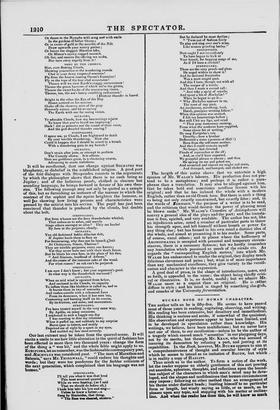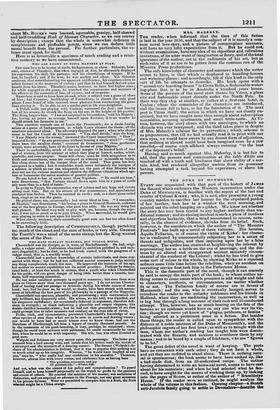BUCKES BOOK OF HUMAN CHARACTER.
THE author tells us he is fifty-five. He seems to have passed most of those years in reading, cogitating, observing, and writing. His reading has been extensive, but desultory and immethodical. His thinking is curious and acute, if somewhat of the quaintest. His observation and experience appear to have been limited, and to be developed in speculation rather than knowledge. His writings, we believe, have been multifarious ; but we never have met one of them, to our recollection—unless he be the author of a tragedy which caused much "sensation" in our playgoing days, not by its merits, but through Mr. KEAN, who was accused of insuring its damnation by refusing a part, and jeering at its capabilities. In the Book, however, Mr. BUCKS appears to aim at a comprehensiveness of thought and oracular brevity of style which he seems to intend as an imitation of BACON, but which is in reality a copy of HAzurr. Thus much as to the author. To form a notion of the work, let the reader suppose an elderly gentleman of this sort pouring out anecdote, aphorism, thoughts, and reflections upon the bound- less subject of the characters in which man's mind may be deve- loped, and the shapes and modifications that human circumstances may impose ; following no other method than an arrangement of his theme under distinct heads ; limiting himself to no particular form or length, but wisely saying as little, or as much, as he pleases upon any topic, and stopping with his matter or inclina- tion. And when the reader has done this, he will know as much about Mr. Bucxes very learned, agreeable, gossipy, half-shrewd and half-twaddling Book of Human Character, as we can convey by description ; except that the whole is somewhat deficient in completeness and profitable points, since we can deduce little moral benefit from the perusal. For further particulars, the vo- lume must speak for itself.
Here is as favourable a specimen of much reading and a reten- tive memory as we have encountered.
WHO ARE KNOWN BY THEIR M•NNIER8 AT PLAY.
Few men love to be beaten at cards, backgammon, or chess. Sidonius, how- ever, relates of Theoderic, that when engaged at dice, he alternately displayed his eagerness, his skill, his patience, and his cheerfulaess of temper. If he lost, he laughed ; and if he won, he was modest and silent. Yet Sidonius confesses, that notwithstanding the apparent indifference, his courtiers chose to solicit favours in the moments of victory ; and that he had himself derived some benefit from his losses. Theoderic seems, however, to have had higher aims ; for while engaged in the game, he avatched the countenance and manners of his officers in the moments of loss, of victory, and of suspense. Tamerlane is said to have been pleased, when a subject won a game of chess of him ; but Cranmer, Archbishop of Canterbury, is almost the only good player I ever heard of who received more pleasure from overlooking the game than playing it To be able to act a similar part in life were delightful.
A Polish noble was playing with Casimir, surnamed the Just ; and having lost all his money, he struck the King on the ear, in the height of his passion. The King forgave him. " I am not surprised at his conduct," said his Majesty ; for, having no power to revenge himself upon Fortune, it is no wonder he should attack her favourite in me."
This anecdote reminds one of Louis the Fourteenth ; for a doubt having arisen at a game of backgammon, in which Louis claimed the throw, all the courtiers remained silent. The adversary dimputed the cast ; when who should come in but the Count de Gramrnont. " You shall decide," says the king. " Your Majesty is in the wrong," answered the Count immediately. " How ? " inquired Louis: "do you pronounce without hearing a single word ?" "Had there been the smallest doubt," returned de Grammont, " those gentlemen would, most assuredly, have all declared in favour of your Majesty." There is, undoubtedly, much of the real temper to be learned both of men and of women, from the manner at which they play at hazard, ombre, whist, quadrille, and even picquet. Some will cheat, some be little scrupulous as to truth and concealment, some are overjoyed at winning or miserable at losing. But chess shows less of the temper than of the mind. This game has been compared to a battle ; but it resembles much more intimately the intrigue of a cabinet, in which no one can adequately act the part of first Minister who does not see the various motives and observe the different vibrations which agi- tate or harmonize the entire machine of general politics. No one hated to lose at cards more than Napoleon. " He could not bear," says Bourrienne, " that Fortune should frown upon him in a game of cards any more than in a field of battle."
In going to Egypt, his conversation was of science and art, hope and victory sitting near him. But on his return all was monotonous, and apprehension rendered him listless. Then he resorted to cards ; and, as a short game suited best, viugt-et-un was the game.
He played chess, too, occasionally ; but never liked to lose. " I remember, at Mantua," says Bourrienne, "his losing a game to General Beauvoir, reckoned
one of the best players in Europe, who gave him odds. He was any thing but well pleased. He liked very well to play with me, because, though the supe- rior, I was not so much so as to gain always. When successful, he would give over playing in order to rest upon his laurels." When closely analyzed, these exceedingly great men are but too often found to be exceedingly little.
The following description of CHESTERFIELD, though partaking too much of the closet and the limn of books, is very able. GEORGE the Fourth's was a mind of the same stamp, but the King wanted the sense of the Peer.
WHO HAVE ELEGANT MANNERS, BUT VULGAR MINDS.
Chesterfield was the disciple, as it were, of Rochefoucault. He had, origi- nally, a vulgar mind. Cultivation chastized it, ambition polished it, and man- ners disguised it ; but he died, as he had lived, cursed with the gangrene of a vulgar mind, that is, a worldly mind.
Chesterfield had a perfect knowledge of certain individuals, and those con- nected with them ; but he had not sufficient mental compass to judge strictly any thing complicated, much less loan. He improved the manners of his age, but neither its mental capabilities nor its moral practice. Perhaps he deterio- rated both ; at least this much is certain, that a youth who takes Chesterfield for his guide, will run great danger of being little better than a smooth, insi- dious, half-repenting scoundrel.
He has some excellent precepts in regard to manners ; but even these were given to Greece more than two thousand years ago. I do not accuse Chester- field of having read one passage in Aristotle during his whole course of man- hood ; but, had he done so, he would, no doubt, have been struck with amaze- ment at beholding the best part of hi a philosophy in a passage of the Stagyrite. Chesterfield was specious, plausible, and penetrating ; with conversation not only brilliant, but frequently solid. His action, we are told, was dignified, and his eloquence mellifluent; yet occasionally deficient in argument, therefore defi- cient in strength ; at times indicating a plausible and empty elegance, like double-distilled lavender-water ; but lie had not that preeminence of art that could prompt him to inlist manners and conduct on the true side of virtue.
Pride, rank, and circumstance, prevented Chesterfield's knowledge of any
other species of men than what are to be seen in courts and drawing-rooms ; nor would he have had so much leisure even to know those, had not the Dutchess of Marlborough left him a legacy of twenty thousand pounds. As to the innateness of his good-breeding, it may, perhaps, be suspected ; since, though be could treat servants with politeness, he could occasionally be inso- lent, when he could be 80 with impunity. His wit, too, was often directed at good men. Walpole and Johnson are very severe upon this personage. The latter pro-
nounced him a lord among wits, and insists that his letters teach the morals of a strumpet and the manners of a dancing-master. The former (Walpole) de- clares of his administration in Ireland, that it was so popular that nothing was so much cried up as his integrity. Whereas, "lie would have laughed at any one," says he, " who really had any confidence in his morality." Thomson, however, adorns him with every virtue, and celebrates him as having been
" The guardian,orunment, and joy Of polished life."—Winter,656.
And yet, what was the extent of his policy and comprehension? To guard himself, and to keep himself perpetually on the watch to profit by the passions and errors of others. He courted the mistress of his master, was ambitious of distinction, and yet acquired no advance in the Peerage, nor any great accession to his private fortune. Were we permitted to compare him to a fruit, the fruit selected might be a China orange.



























 Previous page
Previous page